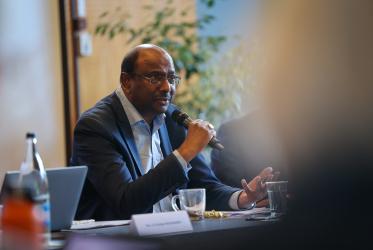A decade from now the general secretary of the Action by Churches Together (ACT) Alliance, Rudelmar Bueno de Faria, envisages ACT as one of the world's largest networks for humanitarian relief.
ACT Alliance celebrates 10 years in 2020, and it has grown to be the world's biggest Protestant and Orthodox network on humanitarian relief, sustainable development and advocacy, de Faria said at a celebration on 27 February.
"In 10 years, we hope to be one of the world’s largest humanitarian and development networks," he said when he asked where ACT Alliance will be in 2030.
ACT Alliance was officially launched on 1 January 2010 as the ecumenical family's agency for humanitarian relief, sustainable development and advocacy.
ACT works where the world is troubled and de Faria said he would visit Mozambique this month on the anniversary of Idai, one of the worst tropical cyclones that wreaked havoc in Mozambique, Malawi and Zimbabwe.
Close to communities when a crisis strikes
“Since its establishment, ACT has always been working with communities around the world. This is especially critical when a crisis strikes; because we are already there. Our members are present where all the big crises are," says the ACT head who is excited along with the members about the progress made in recent years.
ACT Alliance has more than 135 members today and operates part of its secretariat from modest offices in the World Council of Churches (WCC) Ecumenical Centre in Geneva.
"The members are churches and mainly faith-based organizations because of the criteria to become an ACT Alliance member, and we have a presence as an alliance in more than 120 countries," he said.
Through its members ACT is able to mobilize more than 3 billion USD annually.
Since it decentralized as a new entity, 5 years ago the ACT secretariat is now in eight locations with a headquarters in Geneva from where the general secretary operates.
"We have an office for advocacy together with WCC in New York, an office for communication in Toronto and an office for advocacy to the EU, in Brussels," explains de Faria.
There are secretariat offices in Nairobi for Africa, an office in San Salvador for Latin America, an Amman office for the Middle East, and in Bangkok for the Asia Pacific.
The churches-backed network has over the years evolved through different iterations and in 1995 it formally became ACT International.
As the ACT Alliance, chief pilot, de Faria has to juggle between churches, faith-based organizations, governments, the United Nations and civil society as stakeholders in implementing ACT's goals.
"Together, we will continue to speak out, stand up and act against injustice, fight for climate justice, gender justice, the rights of people on the move, peace and human security, and the protection of people affected by emergencies," he said at a 10th-anniversary celebration at the Ecumenical Centre in Geneva.
Complementary roles
At the 27 February celebration, Prof. Dr Isabel Apawo Phiri, WCC deputy general secretary, spoke of the "complementary nature" of the roles of WCC and ACT.
"WCC's roles have more a theological reflecting, inspiring, convening, coordinating and mediating nature, while ACT Alliance's role is more focused on direct facilitation, support and coordination of the implementation of work by its members in specific areas of work. The complementary nature of these roles is a good basis for cooperation."
She noted in her celebration of that, "The WCC, together with the Lutheran World Federation gave birth to ACT Alliance."
"Over this decade, the two organisations continue to accompany ACT Alliance through our participation in the ACT Alliance governing bodies and through joint programmatic activities," said Phiri.
De Faria said in his interview, "In the past, there was some criticism at the more secular approach that ACT was taking but ACT Alliance’s work is genuinely ecumenical and focused on a strong partnership with churches and faith-based actors.
"For instance, now it's mandatory to invite the national councils of churches to take part in the meetings of the national forums and also to establish joint cooperation on thematic areas."
In the last five to seven years, a change has taken place in the way the United Nations and international community view faith-based organizations.
"Governments and international bodies are realizing the importance of religion in the global sphere and at community level; and especially the role of faith-based organizations in engaging with the 2030 agenda for Sustainable Development Goals.”
He believes a turning point in these attitudes was the 2014-2016 Ebola crisis in West Africa where in some of the affected countries churches and faith-based organizations were responsible for the provision of more than 50 percent of the medical services.
During that Ebola crisis, the World Health Organization and the WCC had engaged in mapping different actors responding and changing the cultural procedures relating to burial methods.
"The international community has now realized the normative and operational power of faith-based organizations," concluded de Faria.






